NSG 6320 (NSG 6320)
South University
Page 3 out of 165 results
Sort by
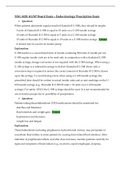
-
NSG 6320 AGNP Board Exam – Endocrinology Prescription Exam
- Exam (elaborations) • 43 pages • 2022
-
- $14.49
- + learn more
NSG 6320 AGNP Board Exam – Endocrinology Prescription Exam 1. Question: When patients administer regular insulin (Humulin R U-500), they should be taught: 5 units of Humulin R U-500 is equal to 10 units on a U-100 insulin syringe. 10 units of Humulin R U-500 is equal to 5 units on a U-100 insulin syringe. 10 units of Humulin R U-500 is equal to 10 units on a U-500 insulin syringe. Correct it should only be used in an insulin pump. Explanation: U-500 insulin is a conc...
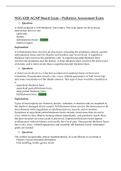
-
NSG 6320 AGNP Board Exam – Pediatrics Assessment Exam
- Exam (elaborations) • 49 pages • 2022
-
- $13.49
- + learn more
NSG 6320 AGNP Board Exam – Pediatrics Assessment Exam 1. Question: A child sustained a "full-thickness" burn injury. This type injury involves tissue destruction down to the: epidermis. dermis. subcutaneous tissue. Correct internal organs. Explanation: A full-thickness burn involves all skin layers, including the epidermis, dermis, and the subcutaneous tissue and fat. Muscles and tendons may be involved. A superficial thickness burn involves the epidermis only. A s...
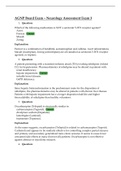
-
AGNP Board Exam – Neurology Assessment Exam 3
- Exam (elaborations) • 38 pages • 2022
-
- $13.49
- + learn more
AGNP Board Exam – Neurology Assessment Exam 3 1. Question: Which of the following medications is NOT a serotonin 5-HT1 receptor agonist? Axert. Fioricet. Correct Maxalt. Zomig. Explanation: Fioricet is a combination of butalbital, acetaminophen and caffeine. Axert (almotriptan), Maxalt (rizatriptan), Zomig (zolmitriptan) are all classified as serotonin 5-HT1 receptor agonists, or triptans. 2. Question: A patient presenting with a transient ischemic attack (TIA) is ...
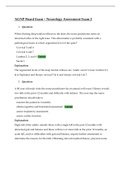
-
AGNP Board Exam – Neurology Assessment Exam 2
- Exam (elaborations) • 72 pages • 2022
-
- $13.49
- + learn more
AGNP Board Exam – Neurology Assessment Exam 2 1. Question: When eliciting deep tendon reflexes in the knee, the nurse practitioner notes an abnormal reflex in the right knee. This abnormality is probably consistent with a pathological lesion in which segmented level of the spine? Cervical 5 and 6 Cervical 6 and 7 Lumbar 2, 3, and 4 Correct Sacral 1 Explanation: The segmented levels of the deep tendon reflexes are: Ankle: sacral 1; knee: lumbar 2,3, & 4; Supinator and...
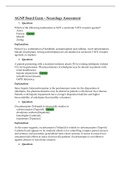
-
AGNP Board Exam – Neurology Assessment Exam
- Exam (elaborations) • 38 pages • 2022
-
- $13.99
- + learn more
AGNP Board Exam – Neurology Assessment 1. Question: Which of the following medications is NOT a serotonin 5-HT1 receptor agonist? Axert. Fioricet. Correct Maxalt. Zomig. Explanation: Fioricet is a combination of butalbital, acetaminophen and caffeine. Axert (almotriptan), Maxalt (rizatriptan), Zomig (zolmitriptan) are all classified as serotonin 5-HT1 receptor agonists, or triptans. 2. Question: A patient presenting with a transient ischemic attack (TIA) is taking...
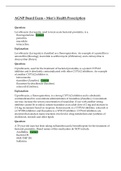
-
AGNP Board Exam – Men’s Health Prescription Exam
- Exam (elaborations) • 19 pages • 2022
-
- $13.49
- + learn more
AGNP Board Exam – Men’s Health Prescription Question: Levofloxacin (Levaquin), used to treat acute bacterial prostatitis, is a: fluoroquinolone. Correct penicillin. macrolide. tetracycline. Explanation: Levofloxacin (Levaquin) is classified as a fluoroquinolone. An example of a penicillin is amoxicillin (Moxatag); macrolide is azithromycin (Zithromax); and a tetracycline is doxycycline (Doryx). Question: Ciprofloxacin, used for the treatment of bacterial prost...
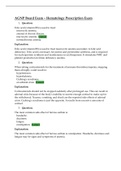
-
AGNP Board Exam – Hematology Prescription Exam
- Exam (elaborations) • 6 pages • 2022
-
- $5.49
- + learn more
AGNP Board Exam – Hematology Prescription Exam 1. Question: Folic acid (vitamin B9) is used to treat: microcytic anemia. anemia of chronic disease. macrocytic anemia. Correct normochromic anemia. Explanation: Folic acid (vitamin B9) is used to treat macrocytic anemia secondary to folic acid deficiency. Folic acid is necessary for purine and pyrimidine synthesis, and is required for nucleoprotein synthesis and maintenance in erythropoiesis. It stimulates WBC and plate...
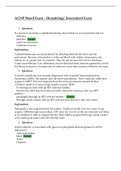
-
AGNP Board Exam – Hematology Assessment Exam
- Exam (elaborations) • 9 pages • 2022
-
- $11.49
- + learn more
AGNP Board Exam – Hematology Assessment Exam 1. Question: If a newborn develops a cephalohematoma, the newborn is at an increased risk for: infection. jaundice. Correct caput succedaneum. erythema toxicum. Explanation: Cephalohematomas are characterized by bleeding between the bone and the periosteum. Because of breakdown of the red blood cells within a hematoma, the infants are at greater risk for jaundice. They do not increase the risk for infections. Caput succe...
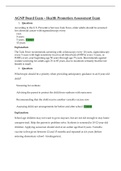
-
AGNP Board Exam – Health Promotion Assessment Exam
- Exam (elaborations) • 28 pages • 2022
-
- $12.99
- + learn more
AGNP Board Exam – Health Promotion Assessment Exam 1. Question: According to the U.S. Preventive Services Task Force, older adults should be screened for colorectal cancer with sigmoidoscopy every: year. 2 years. 5 years. Correct 10 years. Explanation: The Task Force recommends screening with colonoscopy every 10 years, sigmoidoscopy every 5 years with high-sensitivity fecal occult blood tests (FOBTs) every 3 years, or FOBTs every year beginning age 50 years through ...
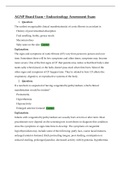
-
AGNP Board Exam – Endocrinology Assessment Exam
- Exam (elaborations) • 21 pages • 2022
-
- $12.99
- + learn more
AGNP Board Exam – Endocrinology Assessment Exam 1. Question: The earliest recognizable clinical manifestation(s) of cystic fibrosis in an infant is: History of poor intestinal absorption Foul smelling, frothy, greasy stools Meconium ileus Salty taste on the skin Correct Explanation: The signs and symptoms of cystic fibrosis (CF) vary from person to person and over time. Sometimes there will be few symptoms and other times, symptoms may become more severe. One of the ...

Did you know that on average a seller on Stuvia earns $82 per month selling study resources? Hmm, hint, hint. Discover all about earning on Stuvia


